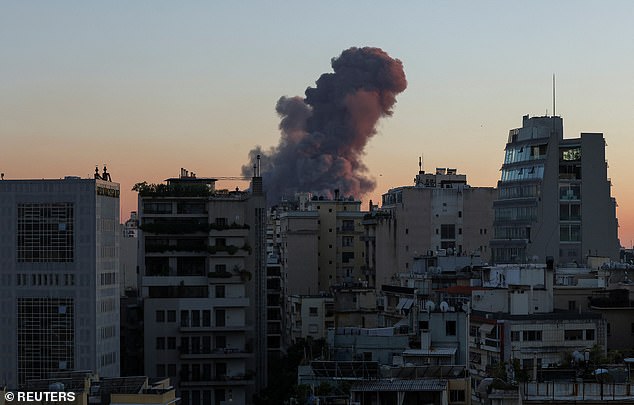Huge clouds of smoke rose over Beirut this afternoon following reports of airstrikes in the Lebanese capital.
Residents said they heard multiple explosions on Friday, believed to have come from Israeli “bombings,” according to journalist Mounir Rabih, on the ground.
Hezbollah’s Al-Manar TV reported that Israeli strikes had destroyed four buildings in Beirut’s southern suburbs.
The reports of attacks came minutes after Israeli Prime Minister Benjamin Netanyahu gave a defiant speech at the UN General Assembly, vowing to continue attacking Hezbollah in Lebanon. until Israel achieves “total victory.”
“My country is at war, fighting for its life,” Netanyahu said in his impassioned speech to the UN General Assembly.
‘We must defend ourselves from these savage murderers. “Our enemies not only seek to destroy us, but they seek to destroy our common civilization and return us all to a dark age of tyranny and terror,” he told delegates.
Residents said they heard multiple explosions on Friday, believed to have come from an Israeli “bombing.”
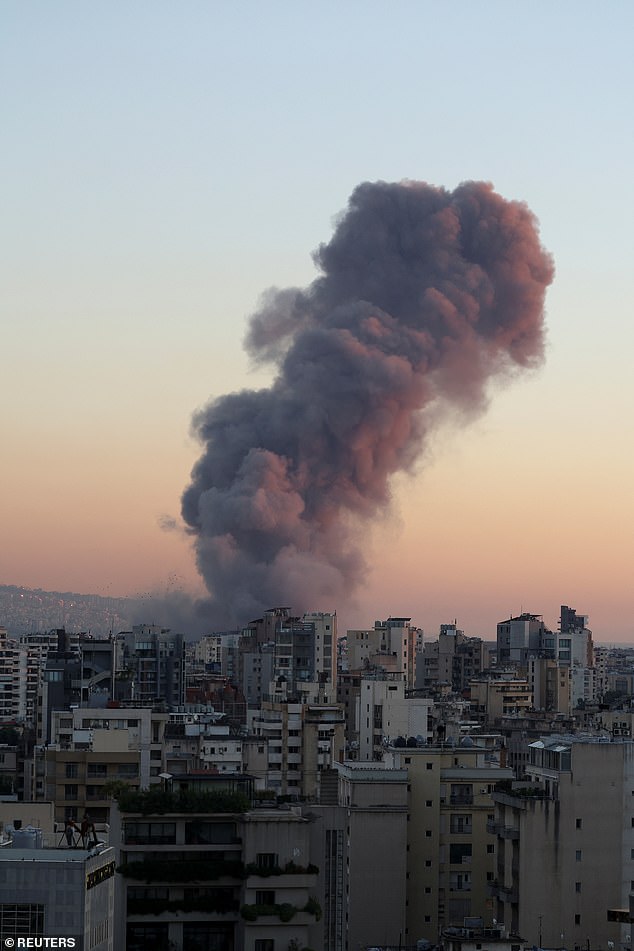
Huge clouds of smoke rose over Beirut this afternoon
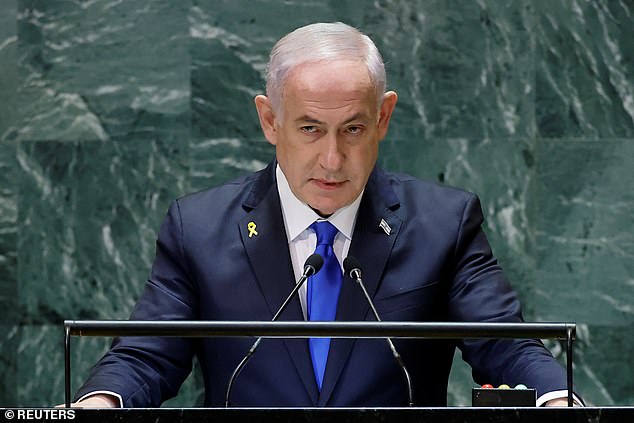
Israel’s Prime Minister Benjamin Netanyahu addresses the 79th United Nations General Assembly at UN Headquarters in New York, US, on September 27, 2024.

A view shows damage at the site of the Israeli attack in Saksakiyeh, southern Lebanon, on September 27, 2024.
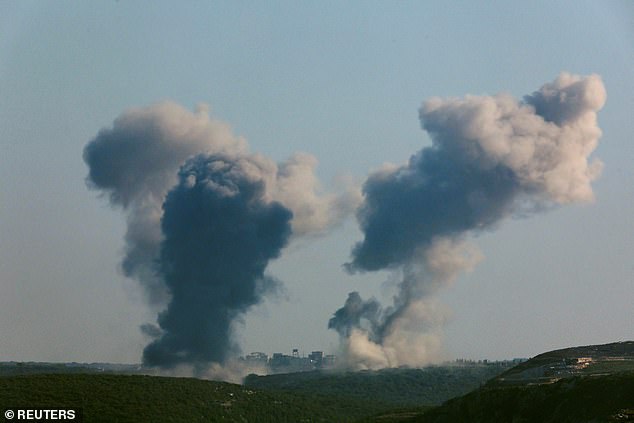
Smoke rises over southern Lebanon following an Israeli attack, amid ongoing cross-border hostilities between Hezbollah and Israeli forces, as seen from Tyre, Lebanon, on September 27, 2024.
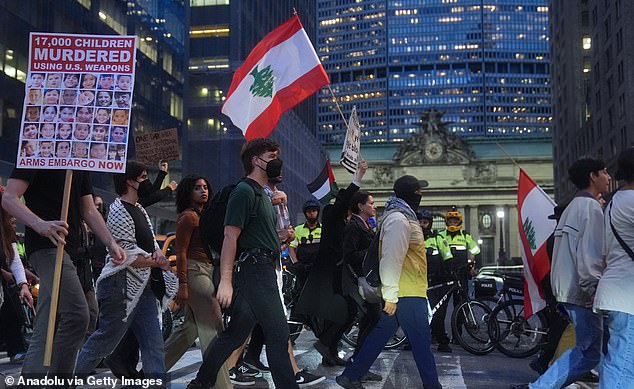
Anti-war activists demonstrate in front of the hotel where Israeli Prime Minister Netanyahu is staying, who is in the city to attend the annual sessions of the UN General Assembly.
In a message he addressed to ‘the tyrants of Tehran’, he said: ‘If you attack us, we will attack you… There is no place in Iran where the long arm of Israel cannot reach. And that goes for the entire Middle East.”
His speech made no mention of the 21-day ceasefire proposal put forward by the United States, France and other allies on Wednesday, which seeks to cool tensions and allow room for talks as the region appears to be on the verge of a total agreement. war.
“We are winning,” Netanyahu said triumphantly, as Israel continues to bomb Lebanon as part of its campaign against Hezbollah, which he called the “terrorist organization par excellence.”
Widespread airstrikes in the south of the country and in the capital, Beirut, have left hundreds dead, including civilians, children and paramedics, in just a few days.
Protesters gathered in front of the UN condemning Netanyahu, who has vowed to continue the battle against Hamas until “total victory” is achieved.
He went on to say regarding Israel’s war against Hamas and Hezbollah: “We will fight until we achieve victory, total victory, there is no substitute for it.”
His speech was met with applause from some allies in the audience, but also with boos, and many delegates walked out when he took the stage.
Netanyahu said he had no intention of coming to New York to address the UN Assembly this year, but felt compelled to do so “to set the record straight” after what he called “the lies and slander directed against my country by many of the speakers. on this podium.”
He denounced the UN, as he has repeatedly in the past, calling it “a house of darkness” and a “swamp of anti-Semitic bile” and saying that Israel should be treated as fairly as other nations.
He said the body had passed more resolutions against Israel than all other nations combined over the past decade, adding that “war criminals” are in Iran, Gaza, Syria and Lebanon.
The two speakers who preceded Netanyahu on Friday insisted on criticizing Israel for its actions in Gaza, where tens of thousands of people have been killed over the past year.
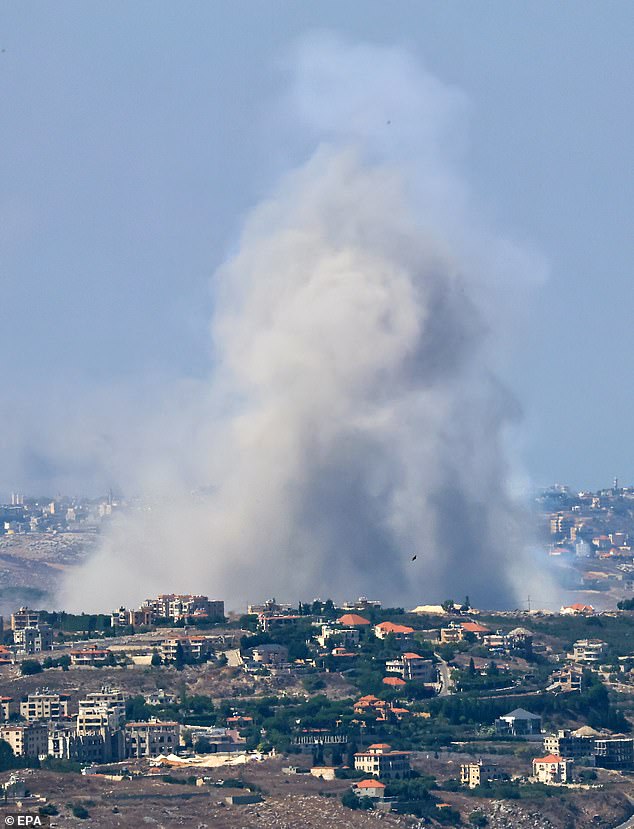
Smoke rises from the site of an Israeli airstrike targeting villages in southern Lebanon, as seen from Marjaayoun, southern Lebanon, on September 25, 2024.
“Mr. Netanyahu, stop this war now,” Slovenian Prime Minister Robert Golob said as he closed his remarks, pounding the podium.
Pakistani Prime Minister Shehbaz Sharif, speaking just before the Israeli leader, declared of Gaza: ‘This is not just a conflict. This is a systematic killing of innocent people of Palestine.’
Israel’s campaign in Gaza has killed more than 41,500 Palestinians and injured more than 96,000, according to the latest figures released Thursday by the Health Ministry.
In recent days, Israel has focused its attention on the border with Lebanon, where it is targeting Hezbollah, a proxy for Iran.
Hezbollah began attacking Israel almost immediately after October 7, saying that the almost daily rocket fire into northern Israel over the past 11 months was to show solidarity with Gaza.
Israel faces pressure from its allies over its conduct in Lebanon, with many thousands of civilians displaced by the attacks and hundreds killed.
Shelters hastily set up by the government on Monday quickly became overcrowded, leaving many seeking shelter in cars on the side of the road.
“We had a lot of problems on the way to get here,” said Issa Baydoun, who fled the village of Shihine when it was bombed.
“We evacuated our homes because Israel is attacking civilians.”
Israel maintains it is targeting Hezbollah weapons and rocket launchers throughout southern Lebanon and the Bekaa region to the north.
IDF spokesman Daniel Hagari has said that Israel intends to keep operations “as short as possible” and insisted that the army makes “great efforts not to attack civilians.”
“As for the high number of victims, each one of them is a tragedy in Lebanon,” he said.
But fears are growing that the attacks could soon lead to an all-out ground invasion.
The Israeli government faces immense domestic pressure to ensure that those displaced by the conflict in the north can return to their livelihoods.
Some 60,000 people have been evacuated since Hezbollah began firing rockets into Israel in support of Hamas in Gaza.
Maj. Gen. Herzi Halevi further raised the threat of a ground invasion on Wednesday and told troops to prepare to receive troops on the ground.
He said this week’s harsh airstrikes were designed to “prepare the ground for their possible entry and continue to degrade Hezbollah.”
The Israeli military has said in recent days that it had no immediate plans for a ground invasion, but Halevi’s comments were the strongest yet, suggesting troops could move in.
Israel said on Wednesday it would activate two reserve brigades for missions in the north, another sign that Israel plans tougher measures.
“This will allow the continuation of the fight against the terrorist organization Hezbollah,” he said in a statement.
According to Lebanese figures, almost 800 people have been killed in Israeli airstrikes against Lebanon over the past week.
Continued fighting between Israel and Hezbollah has forced tens of thousands of people to flee their homes on both sides of the border.
Israel vows to intensify its attacks against Hezbollah until its citizens can safely return to their homes.
The joint ceasefire statement issued Wednesday said the situation in Lebanon has become “intolerable” and “benefits no one, neither the people of Israel nor the people of Lebanon.”
US Secretary of State Antony Blinken met with Israel’s strategic affairs minister in New York on Thursday and told him that the ceasefire would “allow civilians on both sides of the border to return to their homes.”
“Further escalation of the conflict will only make that goal more difficult,” spokesman Matthew Miller said in a statement.


